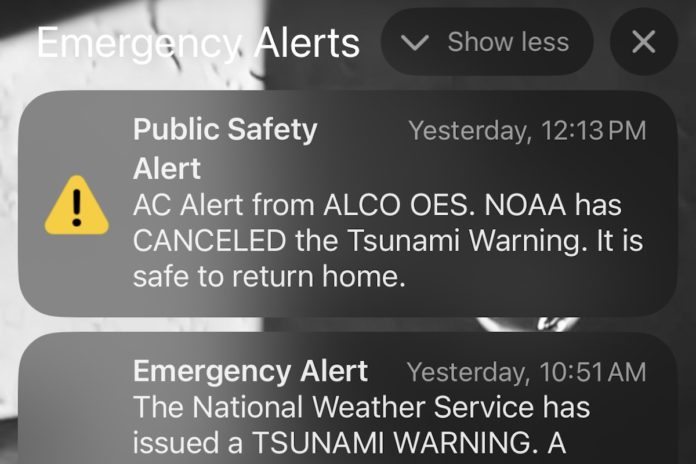Midmorning on Thursday, Dec. 5, smart phones around the Bay Area blared the most annoying phone noise in existence. People nabbed their devices, expecting to see an amber alert for a missing adult, and definitely wanting to make the cacophony stop. Instead, they saw something more unusual: a tsunami warning.
Catastrophic earthquakes such as the 1906 San Francisco quake and the Loma Prieta quake of 1989—which claimed 63 lives—loom in the minds of everyone in the Bay Area. So residents had reason to worry over the 7.0 earthquake that hit off the coast of Humboldt County at 10:44am. Out of an abundance of caution, San Leandro Public Library closed the Manor Branch Library for the day as the building is near the marina. Luckily, the tsunami warning was canceled an hour after the alert, according to the San Francisco Chronicle.
This time, no action was needed. But the warning raised questions about the efficacy of phone alerts, as people up and down the West Coast took to social media to post questions whether they were actually in a tsunami zone and what to do if so. On Bluesky, a Seattleite posted to check in on West Coast friends who might be affected. In a post to the r/BayArea reddit, people in Fremont and Livermore were unconcerned—even joking about evacuating up to Mission Peak and Mt. Diablo—as were Berkeleyites who received evacuation orders for low-lying areas of the city. The vibes-based consensus was that avoiding beaches and low-lying areas was sufficient caution.
But what if the warning had heralded a real disaster? With vague information covering such a wide area, it was difficult to know who was truly at risk and what action to take, if any. According to the National Ocean and Atmospheric Administration, tsunami risk can last hours or even days after the initial warning, so it’s possible to be lulled into a false sense of security after an earthquake passes. In general, however, residents had the right idea about avoiding beaches and getting to high ground.
Since the phone alerts don’t always come with the specific details needed, it’s good for residents to be aware ahead of time what disasters are most likely to happen in their area (earthquake, tsunami, wildfire, flooding) and the basics on what action to take to stay safe. A real crisis is a bad time to start Googling.




